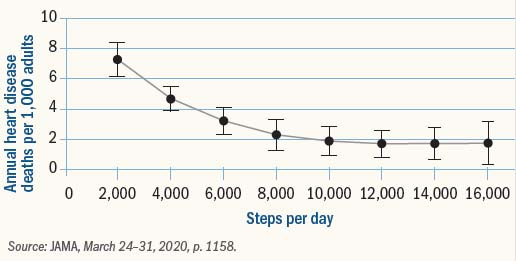Step up your walking game
A new study offers strong support for the life-extending effects of a daily walk.

Want to lower your odds of dying of heart disease? If you don't exercise regularly, taking an extra 4,000 steps per day may help, even if you walk at a leisurely pace, a new study finds.
The study included a nationally representative sample of 4,840 Americans ages 40 and older. For about a week, the participants wore on their hips a device called an accelerometer that recorded the number of steps they took each day. Researchers found that the more steps people took, the lower their risk of dying over the following 10 years, regardless of their age, sex, or race. In fact, compared with people who walked 4,000 steps per day, those who walked 8,000 steps daily were about half as likely to die for any reason — but especially from heart disease. The findings were published in the March 24–31, 2020, issue of JAMA.
"This study supports what we know about the marked benefit of achieving about 8,000 steps per day," says Dr. Edward Phillips, assistant professor of physical medicine and rehabilitation at Harvard Medical School. Most people typically get around 3,000 to 4,000 steps per day without doing any intentional exercise, he notes. That includes things such as doing household chores, checking your mailbox, or going grocery shopping, for example. "But if you regularly walk another 4,000 steps a day to reach a total of about 8,000 steps per day, there's a dramatic difference in whether you live or die over the next decade," says Dr. Phillips.
Although these observational findings can't prove that walking helped stave off death, the study has a number of strengths, including the diverse study population and long follow-up, he adds. Also, data from accelerometers is more reliable than relying on the participant's self-reported activity.
The math makes sense
Four thousand steps equals about 2 miles, which most people can do in 40 minutes or less, since the average person's walking speed is about 100 steps per minute. But if you pick up your pace and cover a mile in just 15 minutes instead of 20, you can log 4,000 steps in just 30 minutes. That happens to be pretty close to the 150 minutes per week of physical activity recommended by federal guidelines, says Dr. Phillips. But in the study, walking speed didn't make a difference in mortality. What mattered was how far participants walked, not how fast they did it.People who took 12,000 steps per day had an even lower risk of dying from heart disease than those who did 8,000 daily. But the added benefit was small, and walking even more didn't seem to make a difference (see graph, below).
Walking your way to a longer life
Taking 8,000 steps per day may slash your risk of dying from heart disease.
|
Why 10,000?
Although 10,000 steps has long been touted as an ideal daily goal (it's often the default setting on fitness trackers), that specific number was apparently based on a marketing tool rather than a scientific study. In 1965, a Japanese business, the Yamasa Clock and Instrument Company, sold a pedometer called Manpo-kei, which means "10,000 steps meter" in Japanese. "Apparently, the company chose that number because the Japanese character for 10,000 looks like a person walking," says Dr. Phillips.Some people like keeping track of their steps with pedometers or activity trackers, which are ubiquitous on smartphones and smart watches. But most people only use them for a short time. "If you want to count your steps, that's great. If not, don't bother," he says. Keeping track of the time you spend walking is just as good.
The bigger challenge may be motivating yourself to get started if you aren't accustomed to regular physical activity. Preventing heart disease and living longer may feel too distant or abstract, so focus on a short-term goal, Dr. Phillips suggests. Walking can relieve anxiety and stress, which his patients find is a good inspiration for getting outside routinely.
These tips may help make your walks more enjoyable:
- Buy a good pair of shoes. Look for supportive but flexible soles that cushion your feet. Choose shoes with "breathable" uppers, such as nylon mesh.
- Dress for comfort and safety. Dress in layers so you can peel off garments if you get hot. Light-colored clothes and a reflective vest help drivers notice you.
- Find a safe place to walk. Quiet streets with sidewalks, park trails, athletic tracks at local schools, or shopping malls are often good choices.
- Do a five-minute warm-up and cool-down. Start off at a slower pace for your warm-up. At the end of your walk, slow down to cool down.

No comments:
Post a Comment